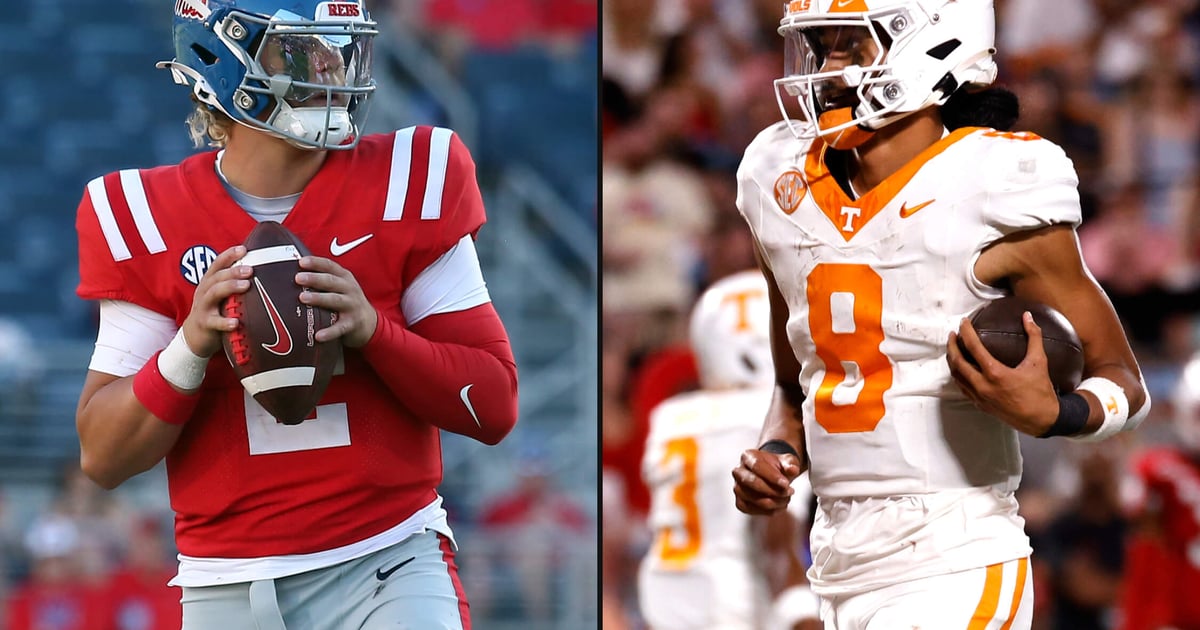In the old days, they were known as big plays. Or maybe long plays. It’s not clear when, or why, football people started to refer to them as “explosive plays” or just “explosives.” It was probably around the time football people started referring to position groups as “rooms.”
The football people also can’t quite agree on what defines an explosive play, because there is no official definition: Some use 15-yard runs and 20-yard passes. Others use less.
“People tend to slant those to whichever one is favorable to them,” Georgia coach Kirby Smart said last year.
There has been a growing consensus, however, that a stat is very important: Explosive play margin, as in who has more in a game, is heavily indicative of who wins the game. Maybe it was always that way, maybe it means more in this era of higher scoring and more passing, meaning bend-but-don’t-break defenses have the upper hand, and ground-and-pound offenses don’t.

Free, daily sports updates direct to your inbox.
Free, daily sports updates direct to your inbox.
Georgia’s survival at Kentucky is a prime example: Kentucky outgained Georgia in yards, 284-262, and had a good running game in the second half. But in that decisive second half — using the definition of explosives as rushes of 12-plus yards and passes of 16-plus — Georgia had five explosive plays (three passes, two runs), Kentucky only had one, as Georgia’s defense gave ground but firmed up when it needed to.

Georgia coach Kirby Smart, Carson Beck (15) survived against Kentucky on Saturday with a 13-12 win. (Carter Skaggs / Imagn Images)
That’s just one example from this season, when the data continues to show, along with previous seasons, that explosive play margin is a key factor:
2024 (so far)
In SEC play — conference or nonconference — the team that wins explosive play margin has a 32-2 record.
The biggest exception is Arkansas, which was plus-15 in its overtime loss at Oklahoma State, with the Razorbacks blowing a huge lead and killing themselves with penalties (seven for 70 yards) and turnovers (minus-two). The other one was Vanderbilt (nine explosives) in its five-point loss to Georgia State (eight explosives).
When the explosive play margin is even or close, teams give themselves a chance. But the worse it gets, the harder it gets. Here’s a breakdown by margin, via TruMedia:
- +10 or better: 10-1
- +5 to +9: 13-0
- +1 to +4: 9-1
- Even: 1-2
- -1 to -4: 3-4
- -5 to -9: 0-3
- -10 or worse: 0-1
On a cumulative basis, the data is similar. There are three SEC teams with losing records, and those three rank in the bottom four in overall explosive play margin. The only SEC team with a negative differential and a winning record is LSU, which was minus-10 in its season-opening loss to USC, but plus-five in its win at South Carolina.
SEC explosive plays per game
| Team | Explosives | Opponent explosives | Differential |
|---|---|---|---|
|
16.00 |
2.67 |
13.33 |
|
|
18.00 |
6.00 |
12.00 |
|
|
17.00 |
5.33 |
11.67 |
|
|
10.33 |
2.67 |
7.67 |
|
|
11.67 |
4.33 |
7.33 |
|
|
10.67 |
4.00 |
6.67 |
|
|
7.67 |
3.00 |
4.67 |
|
|
11.00 |
7.00 |
4.00 |
|
|
8.00 |
5.33 |
2.67 |
|
|
8.00 |
6.67 |
1.33 |
|
|
6.00 |
5.67 |
0.33 |
|
|
7.67 |
7.33 |
0.33 |
|
|
5.00 |
5.00 |
0.00 |
|
|
9.00 |
9.67 |
-0.67 |
|
|
8.33 |
9.33 |
-1.00 |
|
|
7.67 |
9.00 |
-1.33 |
Source: TruMedia
Recent season history
Between 2019-23, SEC teams that had more explosive plays than their opponent had an overall record of 397-72. And the higher the margin in that game, the more likely they were to win, per TruMedia:
- +10 or better: 52-2 (.963)
- +5 to +9: 153-9 (.944)
- +1 to +4: 193-61 (.760)
- Even: 42-38 (.525)
- -1 to -4: 62-145 (.300)
- -5 to -9: 10-87 (.103)
- -10 or worse: 2-16 (.111)
(For what it’s worth, four of the 12 losses by teams with five-plus margins were during the 2020 COVID 19 season.)
On a cumulative basis, the five SEC champions — and six College Football Playoff participants, meaning Georgia in 2021 — each averaged 3.5 more explosive plays than their opponents. The four SEC teams that won the national title during that time each averaged at least four more explosive plays than their opponents.
Does defense win championships? No, explosive play margin does.
The reason for the data
Three-and-outs are great, but not necessary and also much harder to get than they used to be: Per TruMedia, the rate of three-and-outs forced by SEC defenses has gone down, from 35.5 percent of drives in 2004 to 31.5 percent in 2014 to 27.8 percent so far this year.
But the defenses that force the offense to stay on the field for longer, thus increasing the chance for mistakes, give themselves a better shot.
Georgia’s defense hasn’t given up a touchdown during the past four games, and in the season opener, Clemson was held to three or fewer plays on six of its 11 possessions. But on Saturday night, Kentucky only had one three-and-out among its 10 drives. The bigger deal was preventing the Wildcats from getting into the red zone on all but one of their possessions.
On the other side of the ball, the offenses that get bigger chunk plays decrease their chances for mistakes. Time of possession, as a result, has become much less meaningful: Ole Miss (28 minutes, 55 seconds), Alabama (29:10) and Georgia (29:42) are all averaging less time of possession than their opponents so far. Tennessee (30:48) and Texas (30:21) are barely above the mark.
It’s a higher-scoring era, and coaches would rather have points than long drives that only get three points. Turnover margin still matters, as do field position and some other traditional factors. But explosive play margin is the one that may tell the story as much as any.
(Top photos of Jaxson Dart, left, and Nico Iamaleava: Petre Thomas / Imagn Images and Lance King / Getty Images)





